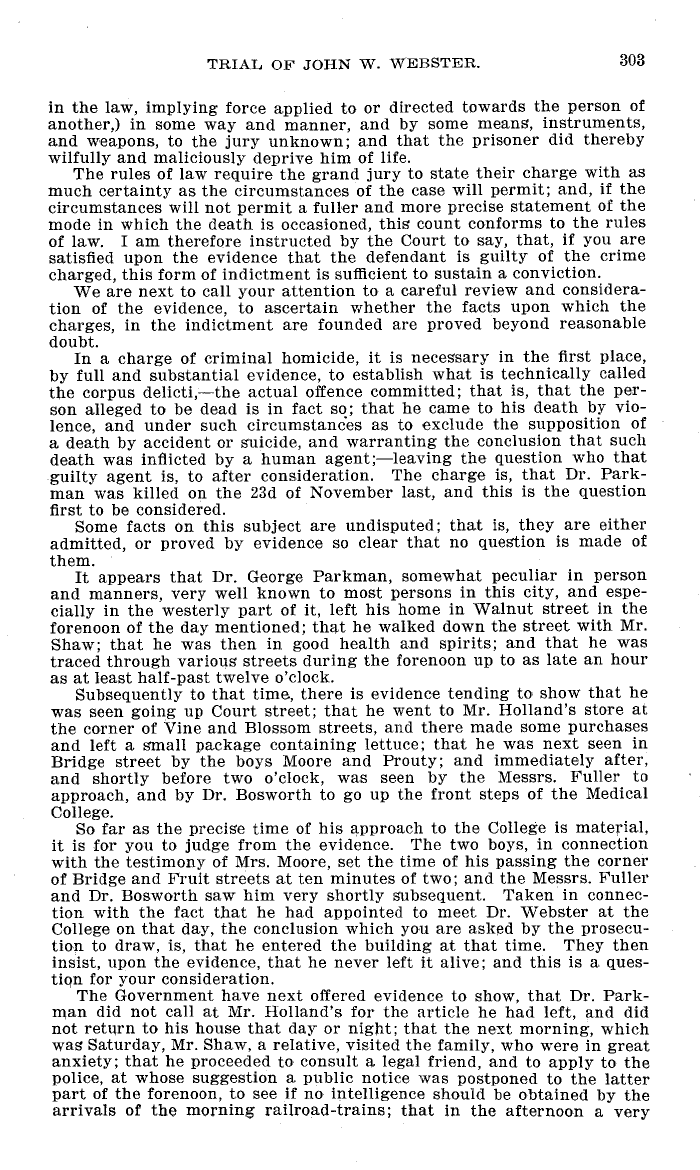|
TRIAL OF JOHN W. WEBSTER. 303
in the law, implying force applied to or directed towards the person of
another,) in
some way and manner, and by some means, instruments, and weapons, to the
jury
unknown; and that the prisoner did thereby wilfully and maliciously deprive
him of
life.
The rules of law require the grand jury to state their charge with as much
certainty as the circumstances of the case will permit; and, if the
circumstances will
not permit a fuller and more precise statement of the mode in which the
death is
occasioned, this count conforms to the rules of law. I am therefore
instructed by
the Court to say, that, if you are satisfied upon the evidence that the
defendant is
guilty of the crime charged, this form of indictment is sufficient to
sustain a
conviction.
We are next to call your attention to a careful review and consideration of
the
evidence, to ascertain whether the facts upon which the charges, in the
indictment
are founded are proved beyond reasonable doubt.
In a charge of criminal homicide, it is necessary in the first place,
by full and substantial evidence, to establish what is technically called
the corpus delicti,-the actual offence committed; that is, that the per-
son alleged to be dead is in fact so; that he came to his death by vio-
lence, and under such circumstances as to exclude the supposition of
a death by accident or suicide, and warranting the conclusion that such
death was inflicted by a human agent; leaving the question who that
guilty agent is, to after consideration. The charge is, that Dr. Park-
man was killed on the 23d of November last, and this is the question
first to be considered.
Some facts on this subject are undisputed; that is, they are either
admitted, or
proved by evidence so clear that no question is made of them.
It appears that Dr. George Parkman, somewhat peculiar in person and manners,
very well known to most persons in this city, and especially in the
westerly part of
it, left his home in Walnut street in the forenoon of the day mentioned;
that he
walked down the street with Mr. Shaw; that he was then in. good health and
spirits;
and that he was traced through various streets during the forenoon up to as
late an
hour as at least half-past twelve o'clock.
Subsequently to that time, there is evidence tending to show that he was
seen
going up Court street; that he went to Mr. Holland's store at the corner of
Vine and
Blossom streets, and there made some purchases and left a small package
containing lettuce; that he was next seen in Bridge street by the boys
Moore and
Prouty; and immediately after, and shortly before two o'clock, was seen by
the
Messrs. Fuller to approach, and by Dr. Bosworth to go up the front steps of
the
Medical College.
So far as the precise time of his approach to the College is material, it
is for
you to judge from the evidence. The two boys, in connection with the
testimony
of Mrs. Moore, set the time of his passing the corner of Bridge and Fruit
streets at
ten minutes of two; and the Messrs. Fuller and Dr. Bosworth saw him very
shortly
subsequent. Taken in connection with the fact that he had appointed to meet
Dr.
Webster at the College on that day, the conclusion which you are asked by
the
prosecution to draw, is, that he entered the building at that time. They
then insist,
upon the evidence, that he never left it alive; and this is a questiqn for
your
consideration.
The Government have next offered evidence to show, that Dr. Parkman did
not call at Mr. Holland's for the article he had left, and did not return
to his house
that day or night; that the next morning, which was Saturday, Mr. Shaw, a
relative,
visited the family, who were in great anxiety; that he proceeded to consult
a legal
friend, and to apply to the police, at whose suggestion a public notice was
postponed to the latter part of the forenoon, to see if no intelligence
should be
obtained by the arrivals of the morning railroad-trains; that in the
afternoon a very
|

